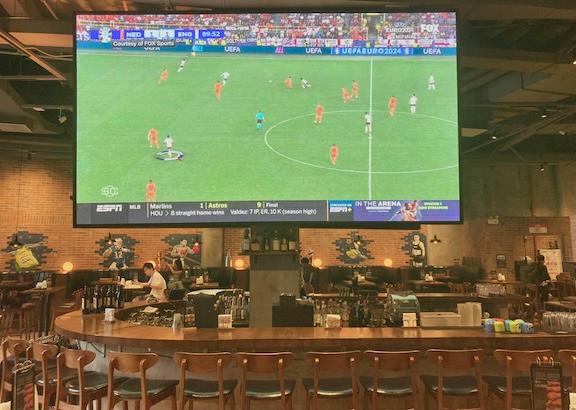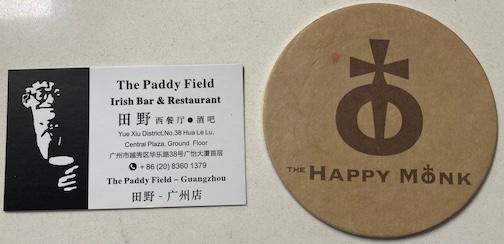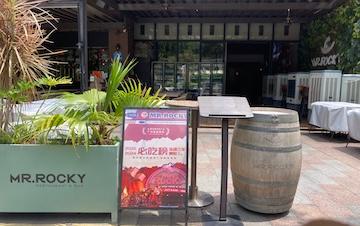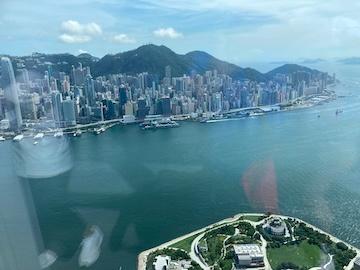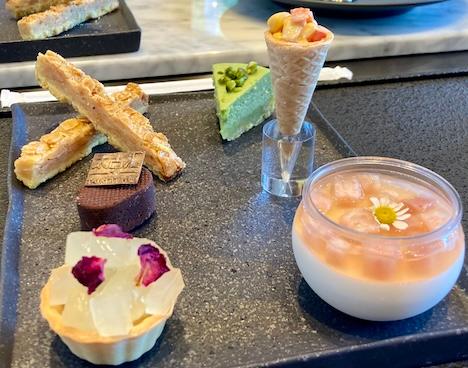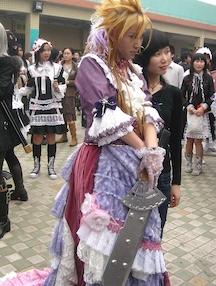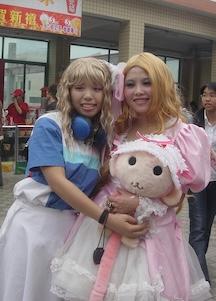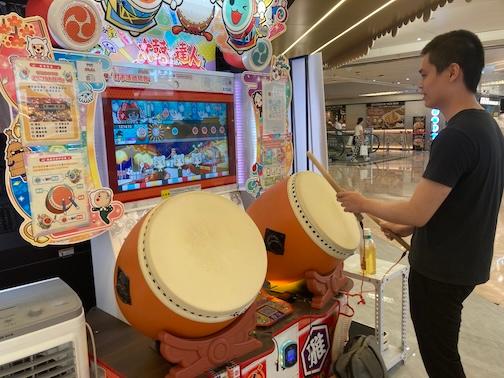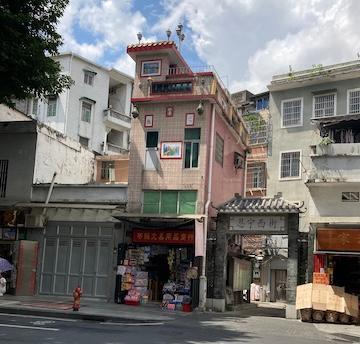China 2024

A view of Guangzhou, China and the Pearl River
The above photo taken from the lanai of the Happy Monk Restaurant. Guangzhou is the economic powerhouse of the PRD (Pearl River Delta) in southern China. During my 10 years in Guangzhou (1997 - 2007), I saw blue skies only once. I later found out that was the week the pollution inspectors came from Beijing to check on the factory emissions. Now, those pollution causing factories have been shut down or moved out of town. During our five week holiday, the skies over Guangzhou could be compared to the skies over Honolulu. Over all, I was highly impressed with the changes that took place while I was absent from the city.
Our 2024 Holiday in China
Recently, my wife, five-year-old son and I took a five week trip to China. My wife was born and raised in China and I lived there from 1997 to 2007. In 2007 we chose to leave China together to live in Hawaii. This 2024 trip was our 17-year homecoming/reunion.
(Note: The below observations are purely my own. They are based on my experiences on this trip and my discussions with numerous Chinese friends whom I have known since the late 1990’s but haven’t seen in seventeen years. It is appropriate to mention, I have more than fifty years experience of living, teaching, traveling and conducting business in China and other Asian countries. I must also mention on this trip, we only visited the PRD area. So in other parts of China, my comments may not hold completely true. However, as Guangzhou is a leader in many ways, I believe most of my comments apply to other locales. If they do not, I believe those other areas will soon follow Guangzhou’s lead.)

A Guangzhou Business District
For this trip, we spent all five weeks in Southern China’s Guangdong Province. We also visited Hong Kong & Hong Kong Disneyland. Our primary purpose was to visit my wifeʻs parents and family in the city of Shaoguan. We wanted to introduce them to their grandson whom, due to covid, they had never met. Our secondary purpose was to catch up with old friends and see what had changed in Guangzhou, our old stomping grounds. We spent approximately half our time in Guangzhou and half in Shaoguan. We also visited Hong Kong and the two very small towns where my wife spent her childhood.
In 2015, we had briefly visited Guangzhou. It was an in-and-out trip, when traveling to Dongbei (Northeast China) where we had attended our friends’ wedding and stayed at the home of a US Consul. Then, we also had a very short visit with my wifeʻs family in Shaoguan, but had little time for Hello’s & Goodbyes in Guangzhou.
Our Observations and Conclusion
Guangzhou is bustling and modern. The city has changed dramatically since we left in 2007. Much of the old has been torn down and replaced with skyscrapers. Because it has changed so much, with regular blue skies, new high-rises and much more greenery, we did not recognize many of the places we use to know. Guangzhou’s economy is thriving and appears very healthy. My wifeʻs family and virtually all of our friends are doing great. YouTube videos say China is heading for a recession and right now, it is at the peak before the fall. If this is true, we saw very little evidence to support this belief.
China, as is the rest of the world, is dealing with changing demographics; evolving technologies; shifting consumer buying habits and economic
challenges. This means if some industries fail to reinvent themselves, they will either shrink or disappear. One negative China is facing, some localities are overbuilt and face problems related to this. Also, some industries, and consequently, their employees, are facing serious economic downturns. On the plus side, China, its businesses and its people have a lot of money. China has built a solid infrastructure and it has been the worldʻs factory for three decades. In addition, China has a proven record of resourcefulness; a large, hard working and capable labor force and a history of overcoming adversity. China’s management seems hard working, dedicated, adaptable and aware of these issues. Over lunch, one of my manager friends made this comment to me over lunch, “Hong Kong businessmen are soft. They drink beer at lunch.” I personally believe, while China may face short term challenges, its positive attributes make it quite capable of overcoming the negative ones.
China is a Cashless Society

The first thing a foreigner realizes is no one in China uses or carries cash. China is now a Cashless Society. Mobil phones are tied to Chinese ID cards and bank accounts. They act as debit cards, so there is no need for cash. My many friends told me they haven’t carried any cash in their wallets for over a year. Whenever they buy something, they pay with a simple swish of their mobil phone. Seeing first hand how efficient the system operates from small convenience stores to the high end restaurants, it seems likely America will follow this path.
While this is convenient for locals, it is terrible for visitors such as my wife and I, who don’t have Chinese bank accounts. I ended up carrying a few thousand RMB (Chinese 7.2 RMB equals one US dollar) in my wallet. My first morning, I went downstairs to a bakery to buy some pastry. The bill was 18 RMB (US$2.50). I handed the clerk a 20 RMB note. She did not have any change in the register to give me, because customers do not use cash. She had to go in the back room to find change for me. This type of situation became a regular occurrence. The clerks roll their eyes when I pulled out a 100 RMB note.

A Guangzhou Coffee Shop
Also, Credit Cards are Old School and Virtually Useless
In Hawaii, I have several standard (Visa/MC) bank issued credit cards that I use on a daily basis for practically everything. In China, my credit cards were virtually useless. Further, they ended up being a blot on my reputation. After a few days, I quit attempting to use my American issued credit cards and switched to carrying a few thousand Chinese RMB in my wallet.
Before I left Hawaii, as instructed I followed my credit card company’s guidelines for overseas travel. I telephoned my credit card company and gave specific details as to the dates and places in my travel plans. Then, in Guangzhou, when I tried to use my credit cards in nice restaurants, they were either rejected immediately, or ten minutes after using it and leaving the restaurant, I received a phone message saying “We declined your $16.75 (or whatever) purchase. Was this you?” Three nights in a row, I made long distance telephone calls to the Credit Cardʻs 1- 800 number to rectify the problem. Each time I asked what was wrong. Each time, my Credit Card representative apologized and said, “Donʻt worry, it wonʻt happen again.” Not true. It happened again, and again, and again. I finally gave up on trying to use my Credit Card. What a joke! But, at the time, highly embarrassing. Coming back to Honolulu and looking at my Credit Card Statement, I see that several of my charges at nice establishments do not appear. The good news: I got free meals and drinks. The bad news: At these places, I purposely spoke with the owners and managers to get a feel for their
operating circumstances. As few people use credit cards, if I come back next year, they will remember me as “the guy from Hawaii who stiffed me.” Thanks again, credit card company!

Convenience Store Selections
When I tried to use my credit cards in convenience stores, the young clerks did not know what credit card are. They would call a manager to ask what to do. Then they would huddle and talk. I imagine their conversations included comments like “My grandmother told me she use to use those kind of cards.”
As using cash normally meant the clerk would need to give me change, this often presented an issue at the cash register. Consequently, at the busy 7Eleven store below my hotel, I would wait for a lull in customer traffic before handing my cash to the clerk. I did not want to aggravate the other customers.
Taking the Metro Subway
When I traveled on the Metro subway without my wife, I was at a loss. Everyone rushed by and entered with a swish of a phone. I stood there confused. I learned I could buy a one day or three day pass, but there was only one machine selling them in the three block long subway station. It was complicated to use the
machine as there was no English, and no Pinyin (Chinese written in our western alphabet). I had to have a Chinese friend use her iPhone to buy me a pass. The next time, after my three day pass expired, I had to search out a subway attendant to sell me enough passes for the remainder of my stay.

Metro 3 Day Pass
The Guangzhou Metro Subway System is Modern, Extensive and Efficient Unfortunately, for foreigners who are attempting to traverse the city, the metro stations on the maps are identified only by their Chinese characters without the pinyin name.


Metro Door Signs - Chinese signage often brighten my day
When I bid adieu to China in 2007, the Guangzhou metro subway system was just up and running. It had a single line that was not convenient for my travels, so I rarely used it. Now, the system has 16 lines that go all over the city. They have started construction on a circular line that will basically intersect with all the other lines while circling the city.
Coming from Honolulu, I was very impressed. I saw what a city can do in a rather short time. Honolulu’s infamous rail system is a humiliating public joke. The system has been in the works from long before most of its citizens were born. After decades of twiddling thumbs and billions of wasted dollars it has yet to reach the city center. So far, the Honolulu system extends only as far as the prison. Forget about downtown, the university and Waikiki. It is a safe bet that the Honolulu system will not reach these sensible destinations for another generation or two.
China is Serious about Eliminating Pollution
I first came to Guangzhou in August of 1997. The Guangdong Government had invited me, as a Foreign Expert, to teach International Marketing at a university. At that time, I was training to run a marathon. My plan included morning jogs around the school’s sport’s field track. I gave up on this idea after only a few days, because I was inhaling too much coal soot. It was so tick, I could taste it in my mouth. Within a few days, I put my marathon plans on indefinite hold. Shortly thereafter, I took up indoor rollerskating as part of my physical fitness
routine. Now, on this trip, seeing blue skies every day and watching joggers train in nearby parks brought joy to my heart.

Fo the last decade or so, Guangzhou has been transforming from a dirty old factory town into a cosmopolitan city that compares favorably to many of the business centers of the world. During my strolls around once familiar places, I

was impressed with the transformations. Old neighborhoods had experienced total makeovers. Along with old factories being replaced by modern skyscrapers, new structures are being built in a fashion that is perhaps best

described as Instant Antiquity.
Roaming through the city, I was continually befuddled, as so many changes had occurred. I felt I was walking through a revolving movie set. I kept asking myself, “Is this the same place I use to know?”
The building and gardens shown in the above and below photos were all created after 2007. I call this neighborhood redo style: Instant Antiquity

Throughout the city, patches of greenery have been added to create mini parks.

China’s Rising Living Standard and Rising Middle Class
Chairman Mao’s, “China’s Women Hold Up Half the Sky” statement, and China’s now cancelled, One Child Policy (effective for 36 years from 1979 to 2015) created two generations of Double-Income-One-Kid families. This resulted in many 4-2-1 families. (4 grandparents, 2 parents and 1 child) Many of these 4-2-1 families live in multigenerational households where one set of grandparents lives in the same household as their children and grandchild. This means there can be four adults contributing paychecks or retirement incomes to a single household.
An interesting side effect of the one child policy: Now, many children do not have uncles, aunts, brothers nor sisters. While China prides itself as a society that values family relations and family ties, it is difficult to reconcile Chinaʻs traditional values with the current reality.
Now, families can have three children, but few are taking the bait. Previously, farm families wanted many sons to till the soil. Now, the massive movement from farms to cities means parents are factory or office workers. This, plus the rising cost of education and the competition for good schools, means there is little interest in having more kids. Unsurprisingly, in many of the families with two
children, the older child is a daughter. In the very few three-child families, more often than not, the first two children are daughters.

Apartment Complex Park Area
My wife’s family is typical of the farm-to-city movement and are an example of the rising middle class. They came from very humble, rural origins. Now, they own a five bedroom apartment (Yes, five!) in a fenced-in modern, security guarded, housing complex of a dozen, 20-story high rise buildings. In the middle of the complex there is a park, with a green area and a playground. A massive parking garage lies beneath the whole complex to accommodate the many vehicles. The complex is centrally located and within walking distance of a shopping area.
My wife’s family home is multigenerational. This is not uncommon in China. Her parents share their 5-bedroom apartment with her brother, his wife and two children. Her brother and his wife have high school educations. They both having mid level jobs with the Toll Road system. Also, they are a two-car couple.
Currently, men retire at age 60 and women at 50 or 55 depending whether they work in a factory or office. Similar to the USA, China is facing a steadily aging senior citizen population. For this reason, the government is discussing raising the retirement age.

Apartment Living Room
Culture Shock
Our five-old son experienced a serious Culture Shock, during his first few days at my wife’s family home. He had never met his grandmother, aunts and cousins. All of these relatives were making a fuss over him. To him, he was in a strange place, with strange people speaking a strange language. These strange people were all smiling; joking; touching his face and arms; trying to hug him; trying to offer him food, and making laughing comments on his half Chinese, half Caucasian appearance. All this in a Chinese language he didn’t understand. He ran to me with tears in his eyes and sobbed, “Dad, Why are these people laughing at me?” He ran into the bedroom and slammed the door. He came out with a Star Wars Light Saber Sword we had bought a day earlier at Hong Kong Disneyland. He started swinging the sword at his startled grandmother and aunts. I felt very frustrated as to how to handle th situation. I told him, “Really, they love you!” It just didn’t sink in. It took him several days to adjust to his newfound popularity. Grandmother, who, with love, kept offering him food, never did change her method of showing affection. My wife asked her to stop pushing food on him and taught my son to say, in Chinese, he was full. But grandma never stopped trying to feed him. After all, this was her way of showing her love.
After his initial hurt, it took several days for my son to warm up to his two cousins. The boy is twelve and the girl is seven. Finally, he did. The girl was tried very hard to be his friend. She would sit next to him whenever he played with his iPad. They ended up being close friends, even though my son does not speak Chinese and the girl does not speak English. She cried uncontrollably when we drove to the train station and said our final goodbyes.

Finally, my son realized he was welcome and part of the family
Guangzhou’s Middle Class
During our two weeks in Guangzhou, we got together for lunch or dinner on at least twelve separate occasions with more than a dozen of our old friends. All of our friends are college graduates and all of them are doing quite well. Two had just purchased new cars the week before we got together. Many couples are two-car families. Interestingly, although all of their lots have improved over the last seventeen years, they all were pessimistic about Chinaʻs short term economic future.
Some friends, who are in the export business, said their businesses are suffering from a worldwide economic slowdown. Also, I saw overstocked shelves in the Tier 4 City, and the excesses in the small shops lining the Guangzhou subway stations. So, I can guess there will be a shakeout of those with inefficient business models. So, I understand my friends’ concerns. But other than these signs of a short term slow down, I saw little other evidence of this.
From Farm to City
Along with the steady growth in the wealth of the middle class society, there has been a steady growth in the number of people who can be classified as middle class. The shift from rural poverty to factory grit to urban wealth is most obvious in the Pearl River Delta. The PRD’s population has shot up from under 20 million in the early 1970’s to 86 million in 2024. That is more than a quadruple leap. In the 1990’s, when I lived in Guangzhou, I often reflected on Carl Sandburg’s Chicago poem from 100 years earlier. “Come and show me another city with lifted head singing so proud to be alive and coarse and strong and cunning.”

Well Stocked Tier Four City Supermarket
Poor Chinese Middle School Students
I feel sorry for Chinese middle school students. I felt sorry for them in the 1990’s and I feel sorry for them now. They are under a lot of pressure from schools, parents and society to succeed and do well. As an example, my wife’s twelve year old nephew had several hours of homework to complete each day, even though we were visiting during his summer holiday.
Back in the early 2000’s, there were many evening cram schools. I regularly saw middle school students coming home at 9:00 PM. Since then, the government has closed down many of these cram schools Also, it is pushing the standard public schools to reduce the daily homework loads. However, with completion to get into top universities and tiger moms being a definite reality, after school classes, tutoring services are now a black market commodity. One friend told me she pays US$90/hour for her son’s Saturday afternoon private English lessons.
If you wonder why many Chinese exchange students do well in our US universities, it is because we get the best and the brightest. We get the small percentage that not only survived, but thrived in the Chinese system. Some families boast on social media about the high scores their sons or daughters received on the national tests. My one friend told me her son is always in the top 5%, but she never publicly states this. She knows the majority of students have unsatisfactory scores for top universities. She also knows some parents feel if children have low scores they bring shame to their families. My friend says she does not want to cause any further hurt by bragging about her son. On a negative side note, stories of teenage suicides are not uncommon.
One Friday noon, a friend invited me to an excellent buffet lunch at a 5-Star hotel. The price per plate was US$50.00. There were several tables full of middle school students. I mentioned my surprised at seeing so many students
unaccompanied by their parents at an upscale dining place. She explained we were near a testing center where a competitive school test was being held the next day. Parents want their children to score high. So, they put them up in a nearby, quality hotel to relieve stress before the test. Also, they wish to insure a possible big city traffic jam does not cause an inconvenience. She said she had done this for her son and considered it a small price to pay. The reward of a high test score is well worth the investment.
Another friend, from Shenzhen, informed me that the city’s population continues to grow at a rapid rate. The supply of high schools can not keep up with the demand. This means, if middle school students do not do well on the test, they can not enter high school and their pubic educations can come to an end.
Tra
With the sharp increase the middle class, car ownership and traffic jams are a big city norm. We were even caught in a traffic jam at 10:00 PM on a Thursday evening. Also, in tandem with this issue, parking lots are full and available parking spaces are becoming a rarity.
In general, automobile drivers and pedestrians are much more disciplined and better at obeying traffic lights and crosswalk etiquette than they were twenty years ago. The one exception is the electric motor bike drivers.
In the past, motor bikes were outlawed, now with the booming home delivery service industry, motor bikes are common. Also, many people use motor bikes for short distance errands. Some of my friends complained about the motor bike drivers reckless behavior, and their disregard for traffic signals and pedestrians. A few times, in crosswalks and on sidewalks I had to jump to avoid being hit by one.
China is a Safe Society
With no one carrying cash in their pockets or purses anymore, there is nothing for pickpockets or robbers to steal. Also, with the many surveillance cameras on the streets, thieves have a hard time hiding their criminal activities. Many of my friends told me the city is very safe, more so than ever before. Admittedly, I had a much stronger feeling of safety walking alone at night, than I did when I lived here, twenty years ago.
While in a bar/nightclub area of the city, I came across a sign that warranted a photograph and deserves mention. Its English words: “Police RemindForbidden to Fight - If you lose will be hospitalized - If you win you will go to jail”
Delivery Services and Apps
Delivery Services are a part of life. From the number of delivery electric motor bikes I saw on the streets, they appear more popular than Amazon is in the USA. I really noticed this on my hotel’s elevators. Almost every time I entered an elevator at least one delivery person with his yellow hard hat was riding up with me. On one occasion, I had five delivery guys on the same elevator with me
Guangzhou attracts many countryside people. In the past, a certain percentage of these migrants turned to thievery or robbery when they ran out of cash and did not have an income. Now, there is little trouble finding a job. Motor bike delivery jobs are plentiful. Anyone can start work the day they arrive in the city. You do not know the city? No problem! Your mobil phone has an app that will guide you from door to door. Besides, many of the deliveries, such as vegetable for tonight’s dinner are quite local and come to you within an hour. A newcomer can quickly learn the neighborhood. So, it seems the boom in delivery service industry is solving both the crime problem, and the unemployment problem.

The popularity of these apps is having a serious negative impact on brick and mortar stores. In the underground shopping strips through which subway passenger must walk there are hundreds of hole-in-the-wall shops. Many are now vacant. One of my friends owns a couple of these booths. When she purchased them, she planned to rent them out to newly arrived entrepreneurs. Now, thanks to online shopping, it has proven to be a bad investment. I tested an app and ordered a world map to use when giving my wife’s nephew English lessons. The map arrived within 48 hours. One friend told me her friend’s young daughter had to go for a hospital X-ray scan. The process required someone having to hold her daughter down for the x-ray. Being pregnant she didn’t want to do this. The solution: She found someone on an app willing to come and hold her daughter down for an hour.
I walked from the Metro to the Pub. Thankfully, my iPhone knew the way
Electronic Recognition Systems are Everywhere
When using public transportation and various facilities, facial recognition is the norm. In my wife’s family housing area, the residents enter by either facial or fingerprint recognition. For me, as an unregistered short term visitor, it meant if I went for a walk alone, I could not reenter the property. When coming back from the market, I would have to wait and sneak in behind when a resident opened the gate.

Parking your car in any public lot? No attendant, no parking stub, no problem. A camera takes a photo of your license plate. Your license plate is tied to your personal information. When leaving, just drive away as a camera takes another photo. Your bank account has been charged by the time you enter traffic.
I am Now in the System . . . Like it or Not
When still in Hong Kong, a few days prior to entering mainland China, we placed our order for reserved seats on a High Speed Rail Train. Normal Chinese scan their official Identification Cards to do this. As foreign visitors, we had to scan the main pages of our US Passport. We did this for all of our train travels. Taking the train alone from Guangzhou to Shaoguan, I didn’t have a ticket. My wife’s brother sent me an iPhone message as to the time, train, car and seat number. When I entered the secure area of the train station, the machine scanned my US Passport. Now, I am in the Chinese government system forever. My intercity travel details are too, . . . forever.
China is serious about Curbing Drunk Driving
One evening, a friend I hadn’t seen in 17 years invited us out for dinner. As he wanted to show us his business setup, we took the Metro Subway forty-five minutes out to meet him. We had dinner at a restaurant near his home and office. We were joined by his wife, two primary school children and his parents who live with him. Then, we viewed his office and warehouse. He sells automobile parts to customers in the USA via eBay. He’s been doing this since 2015. He sells over US$1,000 per day and enjoys a 300% markup. His wife, a cousin and two assistants help him.
He offered to drive us home. Just a week before, he had bought a new van and wanted to show it off. Around ten minutes into the drive, his mother phoned him to remind him he should not be driving as he had had one drink with dinner. He said, “She’s right. I’m sorry, you’ll have to take a taxi.” He pulled over on a busy city street. We all get out and parted ways. It was all very sudden, so we didn’t have a chance to talk. We hailed a taxi and returned to our hotel.
A few nights later, another couple, took us out to dinner with their two school age children. The husband is a partner in a very large law firm. The wife works for a government environmental agency. Both are former police officers. The week before, he had purchased a new Mercedes-Benz van with all the bells and whistles including a very large TV in the back for his children. After dinner he took us on a tour of the new areas of Guangzhou before inviting us to the Party Pier, a complex of bars and clubs. He and I each had one beer. After this, we went to the parking area to retrieve the van. When approaching the van, the husband told me we’d have to wait as the driver had not yet arrived. I was confused and thought to myself, “What driver?” Moments later a guy pulled up on a mini-motor scooter. They put the scooter in the rear of the van and this stranger drove us back to our hotel. I observed several similar mini-motor scooters drivers in the parking area. Later, I learned there was an App for a whole cottage industry of late hour drivers serving the night club area.
A couple of days later, I had lunch with three female police officers. One is my old friend, whom I have known since 1998, when she was a rookie cop with a college degree, just out of the police academy. Now, she is a deputy commander in headquarters. I told her about the two incidents and she explained the situation. In China, if a driver is pulled over at a police road block (I had noticed a few when coming home in taxis), or stopped for suspicion of DUI, and the test shows a .08 alcohol impairment, the driver goes to jail immediately. No ifs or buts. After a few days in the slammer, he or she is brought before a judge. If the evidence proves true, which it normally does (This is China!), the driver can get as much as two and a half years in jail. Plus, if the driver is a government worker (there are many in a communist system), he or she immediately loses his or her job. Again, no ifs or buts. My friend admitted, even the Chinese police consider this double punishment to be harsh. In the USA, the
MADD people can only dream about a government policy such as this. Obviously, the policy curtails the number of drunk driving deaths in the country.
China is Giving Mixed Signals Concerning the Learning of English
During the old days, if I sat down alone in a McDonalds, almost inevitably, a college age person would ask to sit with me and practice English. On this trip, even though there are less foreigners, no one appeared to notice me when I was alone. Also, I experienced very few double takes in the shopping areas or on the subway.
I was told the central government’s position is: “We do not need the West. We are as big as they are and can go it alone. They should learn Chinese if they want to deal with us.” The colleges have reduced the hours of English classes each week from five to two. The missing English classes have been replace with Physical Education classes. There are several gallows humor jokes going on, in college English teacher circles about their future depends on their P.E. skills. Also, in university English classes, where students use to read the works of recognized American or British writers, they now read English translations of Chairman Xi’s Politburo speeches.
At this same time, China is trying to be the big brother to the 54 African countries and other third world countries. And, like it or not, English is the communication language and business language of the world. Good luck!
With the many after school, private English language training companies being shuttered under government efforts to reduce the homework, English classes have become a black market, underground commodity.
Pinyin is Out Along with English
Pinyin is the transliteration of Chinese into our western 26 letter alphabet. There is no Pinyin on the new street signs. This makes it is difficult for a foreigner to get around. Also, in a major book store, I could not find a city map with Pinyin.
Disneyland
Even at Hong Kong’s Disneyland, English is being played down. We stayed two nights at the Disneyland Hotel and had two-day passes. The hotel caters to international guests, mainly from South East Asia. Under the guise of saving the trees and helping the ecology of the planet, the only brochures they offered were in Chinese, no Pinyin. I asked for an English map. And was told they had quit making them. Save the trees! You gotta be kidding. I found it humorous that the Welcome Letter from the Disneyland management for our $300+ per night room was written in Chinglish. I would think Disney could do better.
Foreigners and Ex-Pats
Westerners - During our travels, I met very few Westerners. The Westerners I met, who live in Guangzhou, said there are still plenty Americans and Europeans in the city, even if I did not encounter them. One reason I met next to none, was the bulk had moved further east from where we had lived, to the recently built, new parts of the city. Another reason: the schools’ summer holiday season was in full swing and the families were on extended vacations to their home countries. The third reason, during Covid the Chinese draconian laws had caused many to pack their bags and leave. The fourth reason, China has forced many of the after school English classes to close shop and those teachers have gone home.

Africans - When I left in 2007, my building was an African enclave. At the time, my police officer friend told me, China wanted to place more Chinese construction firms and engineers in African countries. In order to achieve this goal China had entered into numerous Tit for Tat agreements with many African countries that allowed foreign businesses to bring along staffs of up to fifteen people. So, many enterprising exporters brought along their brothers, sisters, cousins and aunts. On this trip, we visited our old apartment building. We were told all the Africans had vacated the premiss and relocated back home or to another location. I saw very few Africans in the shops and on the subway.
Middle Easterners - I did see many Middle Eastern business men. My friends told me, at the twice annual Canton Fair, Middle Eastern countries have become a larger segment of the mix. In the evening, in my old neighborhood, I saw many gathering on the main sidewalk to socialize and talk business. In the past, I had seen this as a common occurrence in Middle Eastern areas.
Japanese - There is a lingering hatred of Japanese. On several occasions in the past, I have had Chinese businessmen tell me of their hatred of Japanese. On this trip I had a friend tell me her 8-year-old son had come home from school and reiterate the school lesson his teacher had printed concerning hating the Japanese. This stems from the terrible atrocities the Japanese army had committed during World War II. It seems China doesn’t want to forget.
The U.S. Consul - I went to the U.S. Consulate at 8:30 AM. Sure enough, there was a line stretching around the corner. So, I went away and had breakfast. I came back at 10:00 AM and there was o line. In the past, there would be a daily line way past lunch time. Also, in the past the US Consul’s Public Affairs section was open to the public. It was near my home and I visited its library regularly to read American newspapers and magazines. Also, I attended lectures and discussions there. Now, the whole US consulate facility is a high security fenced building. This time, I tried to telephone to talk to someone about the state of affairs. No luck. That never happened. The recorded message said to send an email. I did, but, I never got a reply. I was disappointed and wondered what someone with serious problems, such has being arrested, could do.
The Chinese Government is Serious about Curbing Pollution
The worst factories have been shuddered or relocated as Guangzhou becomes a tourism mecca. Now, the sky is blue and joggers are in the parks. These are things I never saw. Perhaps my biggest surprise was seeing a swimmer in the previously polluted Pearl River. Again, this was a first. I watched him swim for around a half mile or more. The government is determined to make tourism revenues a greater percent of the economic revenue pie.

Guangzhou Playground
High Speed Rail
Chinaʻs High Speed Rail, known as bullet trains in other countries, is highly popular. The trains can travel up to 240 mph. On four occasions during my five weeks in China, I took a high speed train. I rode in the economy class section. On each trip, my car was totally full. Each time it appears all the cars were full. Some of my friends, when coming to visit with me, could not make a reservation
at the time they wanted because that train was already sold out. This did not matter too much as the next train departed within a short time. According to the train station departure boards, it appeared trains were coming along more frequently than every 15 minutes.
The negative features of the high speed rail: The economy seating area is cramped, however, it is not as bad as the economy sections on US airlines. A more serious negativity is the limited storing luggage areas. These are long haul trains, so many passenger have suitcases. Some travelers have multiple suitcases. There was very little storage space. Another issue is the short time frame allowed for boarding and disembarking. You gotta be quick.
American Food Chains
McDonald’s, KFC, Pizza Hut and Starbuck’s all have strong footholds in China. However, there is very strong completion from numerous Chinese competitors. The large food mall at my subway station was a conglomerate of both Chinese and American places. McDonald’s was packed, not so much by paying customers, but more because it had a larger seating areas than its Chinese competitors. Teens and 20-somethings sat around playing with their cell phones. The Chinese coffee chain, Luckin, appeared to be beating out Starbucks in popularity. Its quality is good and it’s price is more appealing. For Starbucks, the Guangzhou price was comparable to its sister stores in Waikiki.
Phone Charger Rentals and Bike Rentals
If you are on the go, phone charger rental packs are everywhere. The packs hold a dozen chargers and sit on on the counters of many restaurants and convenience stores. Each charger is slightly larger than a mobil phone. I rented one while having dinner. I got my iPhone from 20% up to 100% charged while I dined. It cost me a US$1.00. If it wasnʻt finished, I could have taken the charger along and dropped it off at another location. There are many.
When I came to China in 1997, personal bicycles were a dying breed. Over that next ten years there were fewer and fewer on the street. Now, thanks to rental bike, there is a resurgence of bike traffic in the congested center city areas.
CGTN is In, Hong Kong TV Stations are Out
When I previously lived in Guangzhou, I had two Hong Kong English language television stations I could tune into. Now, those two stations are totally blocked and the only English news station is CGTN (China Global Television News). It broadcasts all the news the government believes you should know. While there, I did watch news stories on the US presidential elections including Bidenʻs
dropping out and Trump being shot, however, the CGTN gives them no more time and coverage than it does to the political party breakdown of a random African country’s congress. The media continues to portray China as the hero of third world. If you are visiting China, take a look at any edition of China Daily newspaper, no matter the day. More likely than not, you will see a Shake and Smile picture smack dab in the middle of the front page. You will see Chinaʻs paramount leader shaking hands and smiling at some visiting dignitary from a country you never knew existed with the underneath caption including a comment such as “This will lead to greater friendship between China . . . (Fill in the county’s name.)
Humorously, when I first relocated to China in 1997, I tuned on to the Hong Kong television news each evening. Whenever the broadcaster would begin a news item with the words, “And today in China . . .” the television screen and voice went staticky. I would jump up and try to adjust the television saying to myself, “Why does my TV always go on the fritz at the wrong time. It took more than a week before I realized the static was not an accident and, as far as the Chinese government believed, it came at just the right time. Now, both Hong Kong stations are totally blocked
Marketing and Graphic Design
In the past, I sometimes visited the popular book store in the Tianhe section of the city. The store was a drab, dull place. The books had no artwork on the

cover. Now, the place is modern with a definite focus on marketing. I was impressed. The non-book items for sale were similar to those you would find in a museum gift shop.
And yes, marketing is in, like everywhere. Modern graphics promote places and products. Perhaps, nothing reflects the rise of the middle class, more than the modern shopping centers.


ffee Shop Mural
In the shops and stores and throughout the city, I was impressed with the Graphic Design. Artists are being given an open hand to create pleasant, cute and clever illustrations. This was not true in the past.
Local Brands
Local Chinese brands are going head to head, or perhaps, it is more appropriate to say toe to toe with Nike and Adidas. With marketing, competitive prices and sports heroes, the locals are fearlessly jumping into the fray.


Chinese Sports Brand - Peak & a Tommy Hilfiger knock off
Communism or Capitalism? Would Old Chairman Mao approve of this Shopping Center Theme?

Or this one?

No matter, signing often tends to bring me a smile

Signs often catch me off guard and make me ponder what they are trying to say.

To Feel and Be Feeled
One feature of American neighborhoods that fascinates Chinese visitors is the common squirrel. Perhaps that explains this promotion.

Want to go further tap the city limits?
I have the feeling there is less interest in going abroad, than before. Perhaps because, by now, most of my friends have traveled to other countries for business and/or pleasure. I may be wrong, but it appeared the line for visas at the US Consulate was shorter than before. Whatever, there are still businesses willing to take your money and help you get there. For those eager to go further and may be facing obstacles:
Don’t give up!

If you just want to stay put, don’t fret, two things remain Popular: After Lunch Naps and Badminton
At 1:30 in the afternoon college campus walkways are as deserted as they are at 1:30 in the morning. Everyone is taking a nap. In 1970, when I first started to visit business offices in Taiwan, I was shocked to see employees sleeping their desks when I, a foreign visitor, was meeting with the boss. Fifty years later everyone still does. Everyone in my wife’s family home, lays down for a nap after lunch.
Badminton remains popular. In the congested city, two players can manage to find a large enough space to play. Before coming to China, I viewed Badminton as a casual game to play at a picnic. I promise you Chinese take in much more seriously than this. Or, you can join the Dancing Auntie.


